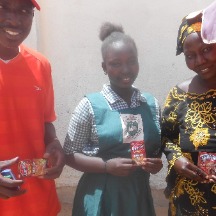Donations from Rose Jackson ($50) of Oxford, North Carolina and Kathleen Trent of San Antonio, Texas ($170) pushed us to our goal of $2,460. Jabel Ceesay, one of our administrators in Nema Kuku, The Gambia will soon forward video thank yous for those who are sponsoring the education of the children in our program.
Unlike industrialized nations where the populations are getting much older, The Gambia is much like other African nations with about 60 percent of the Gambian population being under the age of 25. Consequently, much of the world’s future is African. We are proud that our readers are helping to prepare the world’s future.
Kennis Henry, who support the Port of Harlem Gambian Education Partnership, was excited to visit the Gambia this summer and saw our exhibit “From These Shores,” at the Juffureh Slavery Museum.
“They were excited that we were there and wishes that more of us will come,” she says about the Gambians she met.
The exhibit was “informative, but I did not have enough time to study it,” she added. “I want to go back,” she continued. (The exhibit is online, a first for museum.)
During the Sunday, March 5 opening ceremonies for the “From These Shores” exhibit at the Juffureh Slavery Museum, Hassoum Ceesay, Director General, National Centre for Arts and Culture in The Gambia, proclaimed, “This exhibit raises the museum’s standard to a new level.” The historic markers the exhibit crosses include Africanization, appearance, and internet presence.
In addition to calling the exhibit in the colonial language, English, the display is also titled in six local languages, Mandinka, Serer, Wollof, Jola, Aku, and Fula. The exhibit is also titled in French, the colonial language of neighboring sister-nation Senegal. “For the first time, the museum’s exhibit has been decolonized,” declared Hassoum Ceesay, the director at the National Centre for Arts and Culture which oversees the museum.
He added that the more inclusive title will improve access to the exhibit since less than 40 percent of Gambians can communicate in English. “From These Shores, or “Kabo Nying Fankas,” in Mandinka, also includes a panel on the N’ko script, the first of such panel in the Juffureh, North Bank, The Gambia institution. N’ko is used to write in the Manding languages of which Mandinka is one and is the most dominate language in the West African nation.

Experience Senegal and Gambia with Port of Harlem: during
Tobaski (Eid al-Adha), Mon, Jun 17, 2024
More about Tobaski!:
Is It Christmas, Memorial Day, or Halloween? No, It’s Tobaski!








